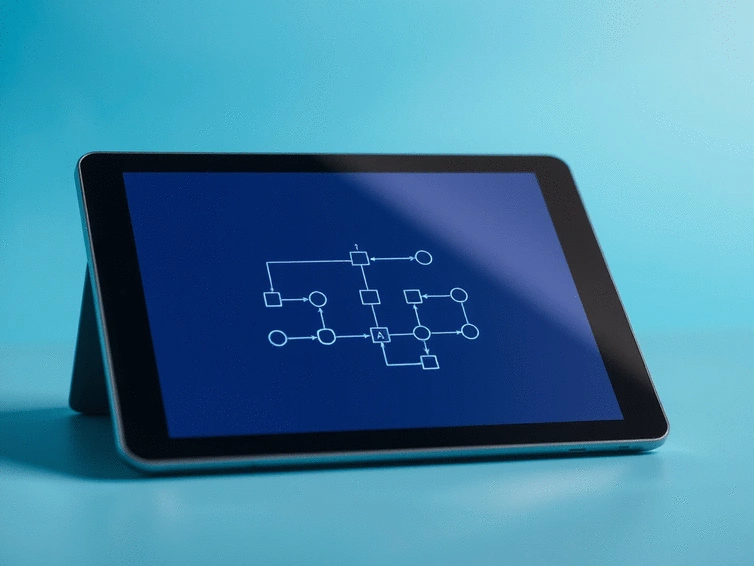Blockchain Fundamentals
- • Decentralization
- • Transparency
- • Security
- • Efficiency

As the world transitions towards a more digital economy, understanding blockchain technology is no longer optional; it's essential. This foundational knowledge not only empowers you in the financial landscape but also opens doors to innovation across various industries.
This visual outlines the foundational principles driving blockchain technology and highlights key developments projected for 2025.
Have you ever heard the term blockchain and wondered what it really means? It's become an essential part of conversations around cryptocurrency and technology, and it’s important for us to understand it, especially as we move into 2025. Blockchain is essentially a digital ledger that records transactions across many computers in a way that ensures the registered information cannot be altered retroactively. This technology is crucial for the integrity and transparency of digital transactions! For a beginner-friendly overview, you can refer to this Blockchain for Beginners Guide.

As we dive deeper into this topic, it’s clear that blockchain isn't just a tech buzzword. Its importance in the financial landscape will continue to grow. By understanding blockchain now, you're positioning yourself to be a part of the future economy, one where digital assets are becoming more mainstream.
These aspects of blockchain technology are critical as we look ahead to 2025. They will define how we interact with money, data, and each other. Think of blockchain as the foundation for a new digital ecosystem, where trust and efficiency reign supreme!
As the founder of How Does Bitcoin Work, I truly believe that understanding blockchain is essential for anyone interested in the future of finance. You might be asking yourself, "Why should I learn about this?" The answer is simple: knowledge empowers you to navigate an increasingly digital world.
Blockchain technology powers cryptocurrencies like Bitcoin and Ethereum, but its applications extend far beyond finance. By learning about blockchain, you’re equipping yourself with the tools to engage with various industries, from supply chain management to healthcare. It’s a versatile technology that offers numerous opportunities for innovation!
In the world of blockchain, cryptocurrencies are the lifeblood that enables transactions and interactions. They serve as the digital currency that fuels the blockchain ecosystem, and understanding this relationship is key for newcomers. Cryptocurrencies are built on blockchain principles, and they work hand-in-hand to create a decentralized financial system. For a deeper understanding of digital currencies and their role, explore this informative report on digital assets.
By exploring these cryptocurrencies, you’ll gain insight into how they influence blockchain adoption and push the boundaries of what’s possible in the digital space. As we continue on this journey, remember that each cryptocurrency has its unique role, shaping the future of financial transactions!
Bitcoin and Ethereum are more than just cryptocurrencies; they are pioneers that have helped popularize blockchain technology. Bitcoin introduced the world to the concept of decentralized currency, proving that peer-to-peer transactions could work without banks. On the other hand, Ethereum broadened our horizons by enabling developers to create smart contracts, which automate processes and expand functionality. The impact of blockchain and its applications, including smart contracts, is further detailed in this academic paper on blockchain technology.
As we embrace the evolution of blockchain in the coming years, understanding these two currencies will provide a solid foundation. They exemplify how blockchain can revolutionize not just financial systems, but countless other facets of life, from contracts to identity verification.
As you explore the world of blockchain, consider following industry leaders and participating in online forums. Engaging with communities like Reddit or Discord groups focused on cryptocurrency can provide you with real-time insights and enhance your understanding of emerging trends. Knowledge shared within these communities can be invaluable as you navigate this exciting technology!
The world of blockchain technology is ever-evolving, and there are exciting advancements on the horizon! As we look ahead to 2025, it's essential to grasp the emerging trends that will shape the landscape. These developments will not only influence cryptocurrency but also countless other industries leveraging blockchain's capabilities.
One significant trend to watch is the rise of quantum resistance. As quantum computing progresses, traditional cryptographic methods may become vulnerable. To combat this, researchers are exploring new cryptographic techniques that can withstand the power of quantum machines.
Additionally, regulatory changes are anticipated as governments start to understand and harness the benefits of blockchain. This evolution could lead to clearer guidelines, making it easier for businesses and individuals to participate in the blockchain economy.
Blockchain isn't just about cryptocurrencies anymore! We're seeing a surge in real-world use cases across various sectors. For example, supply chain management is benefiting from increased transparency and traceability, allowing companies to track products from origin to consumer.
These applications highlight how blockchain is reshaping industries beyond finance, driving innovation and efficiency.

Another thrilling area is Decentralized Finance (DeFi). This movement aims to recreate traditional financial systems—like lending, borrowing, and trading—on the blockchain. By eliminating intermediaries, DeFi empowers individuals with greater control over their assets and financial activities.
With the rapid growth of DeFi, it’s likely we will see more users engaging with these platforms, making financial systems more inclusive and efficient.
At How Does Bitcoin Work, we're committed to making blockchain education engaging! Understanding complex topics is easier when you can actively participate in the learning process. That's why we offer various interactive resources for you to explore.
Test your understanding of blockchain concepts by participating in our fun and informative quizzes! It's a great way to reinforce what you've learned and identify areas you may want to explore further. Are you ready to challenge yourself?
Need a handy reference? We provide a downloadable cheat sheet that summarizes key blockchain concepts. Whether you're a beginner or looking to brush up on your knowledge, having this resource at your fingertips can enhance your learning experience.
Here are some common questions to help solidify your understanding of blockchain:
As we wrap up this section, it’s clear that blockchain technology is set to transform industries and redefine how we interact with digital assets. Understanding these fundamental concepts is crucial for anyone stepping into the world of cryptocurrency.
Blockchain's decentralized nature, security features, and potential applications are reshaping our financial landscape. Remember, the future of finance is not just about currencies; it’s about transparency, security, and accessibility for everyone!
I encourage you to keep exploring! The world of blockchain is vast and filled with opportunities. As you continue your journey, stay curious and open to new ideas. Each step you take will bring you closer to mastering this fascinating technology.
Here is a quick recap of the important points discussed in the article:
Understanding Blockchain Anonymity Features

Imagine navigating a financial landscape where your every transaction is not only secure but also sh
Bitcoin Trends and Predictions Ahead

What if your investments could benefit from the same technology that powers the future of money? In
Bitcoin Mining: Legal Guidelines Worldwide

As we venture into the intricate world of Bitcoin mining, it's vital to be equipped with knowledge a
Understanding Blockchain Anonymity Features
Bitcoin Trends and Predictions Ahead
Bitcoin Mining: Legal Guidelines Worldwide
Bitcoin Mining Issues and Fixes
Blockchain's Impact Across Various Industries